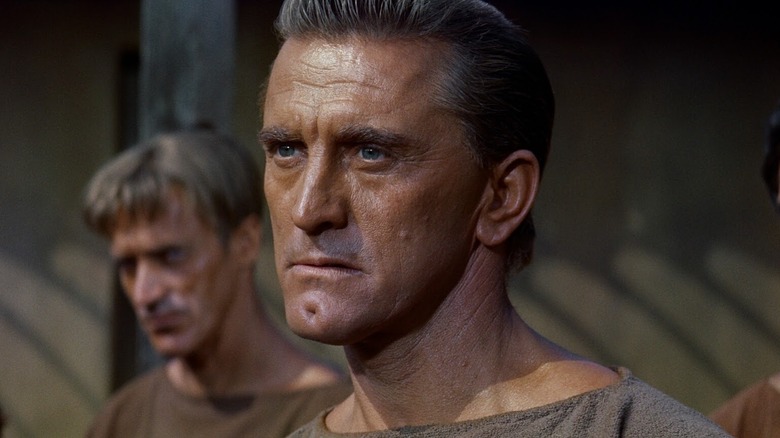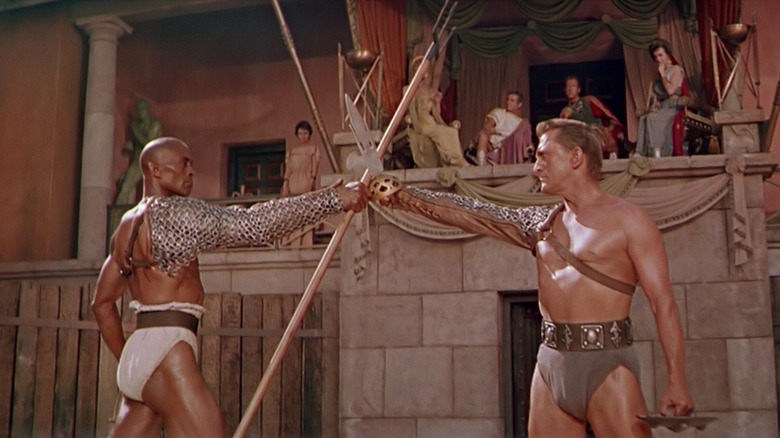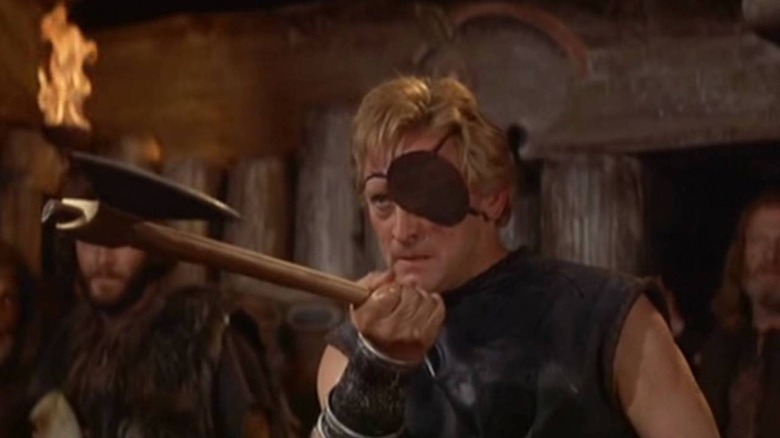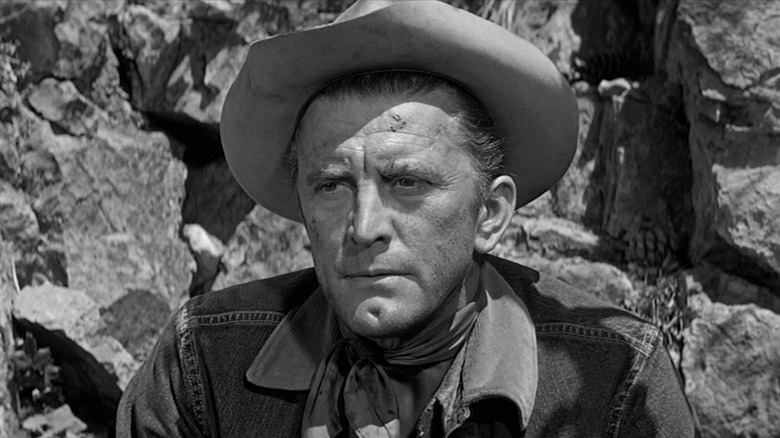This Was Kirk Douglas' Proudest Moment In His Storied Career
Kirk Douglas had many things to be proud of in his life and career. He was a hugely successful movie star, producer and had a wonderful and multi-talented family, but the accomplishment he was most proud of might surprise you.
Douglas made a name for himself as a heroic tough guy on the silver screen, but it turns out he was a stand up guy in real life, too. When he got enough power within Hollywood he created his own production company called Bryna, named after his mother. He didn't do it as some ego stroking power move, he founded Bryna because he wanted to make more challenging pictures, like the anti-war film "Paths of Glory" and the now infamous epic "Spartacus," both directed by Stanley Kubrick.
Because he was a producer on "Spartacus" he was able to make one monumental decision that had an impact not just in his own industry, but in the wide world of politics itself. And what was that huge, history-making decision? Why, it was simply giving the screenwriter a credit on the movie.
A troubling time in American politics
That screenwriter was Dalton Trumbo, one of the best writers of the golden age of Hollywood. If you're not familiar with Trumbo's story you might be scratching your head as to why this is a big deal.
Trumbo flirted with communism in an era where that was really bad news politically and professionally. He was an official party member a mere five years, but it was known enough that he ended up in front of Joseph McCarthy's House Un-American Activities Committee where he and nine other notable liberal filmmakers known by history as "The Hollywood Ten" refused to give any names of other suspected communists. Trumbo was eventually sentenced to almost a year in prison on a contempt of court charge.
Worse still, when Trumbo got out he and the rest of "The Hollywood Ten" were blacklisted by the Motion Picture Association of America, effectively killing his ability to continue his career. The industry didn't want the heat and viewed Trumbo as toxic, but at the same time they also recognized he was one of the best writers in town and wanted his quality screenplays, so Trumbo wrote under a pseudonym at a hugely reduced rate to pay the bills. In this time he wrote a lot of B-movies and also one called "The Brave One," for which his pseudonym won an Oscar for Best Story. Naturally, he couldn't claim his award.
That brings us back to Kirk Douglas
Trumbo was hired to write "Spartacus" and did a bang up job. In an interview with Chet Cooper, Douglas recalled an early conversation with Stanley Kubrick about the screenplay credit on the movie. Would they attribute it to "Sam Jackson" (not that one), Trumbo's preferred pen name at the time? According to Douglas, Kubrick made a move to take the screenplay credit for himself and Douglas shot that down immediately.
Douglas ended up making the brave decision of bringing Dalton Trumbo out from the shadows and giving him the credit he deserved, to hell with whatever political backlash that might stir up.
"I went home that night and I thought, 'The hell with it, I'm going to put Dalton Trumbo [in the credits.]' People thought I was crazy. I said, 'No. What can happen?' So, I invited Dalton Trumbo to come to the studio — the first time he had been in a studio for ten years. I will never forget. He had tears in his eyes. He said, 'Kirk, thank you for giving me back my name.'"
That final quote from Trumbo has stuck with me ever since I first heard this story. Ultimately, Trumbo was credited, the world didn't end, and Kubrick, Douglas, and Trumbo continued to make movie history for a good long time afterward.
A tough guy onscreen and off
Kirk Douglas has said this was his proudest moment, and took credit for "breaking the Blacklist," which might be a tad overblown. Around this same time, director Otto Preminger also had enough of the pseudonym business and gave Trumbo a credit on "Exodus" which came out the same year as "Spartacus."
So, Douglas wasn't the sole man responsible for shattering that extremely shameful shackle of Hollywood history, but the bravery it took for him to stick his neck out like that shouldn't be under-appreciated, either. Douglas could have very well been blacklisted himself, just for being a "communist sympathizer," and he knew it. But it seems he wagered that his carefully built star image, which granted him a considerable position of power in the movie business at that time, would be enough to protect him and his movie from this risk — and he wagered correctly.
You don't get a lot of big screen tough guys showing they are just as brave and selfless as the heroes they portray in movies, but Kirk Douglas was one of the real life good guys. The fact that before his death he looked back at that decision as being the thing he's the most proud of having done in his entire career says a lot about his character, and in his way, he helped pull not just the entertainment industry, but America on the hole out of a particularly shameful period.



